

V Jornada Internacional de Judeidad y Artes del Espectáculo
5. Internationale Konferenz über Judentum und darstellende Kunst
Categorías de la tradición, tradición de las categorías. Judeidad en el teatro, la música y la literatura.
25 Agosto de 2022 | Buenos Aires
Liliana Feierstein spricht über: „El resto y la diferencia en el entramado del pensamiento judío.“
Video: https://www.youtube.com/watch?v=rnhi8lUCZ8c
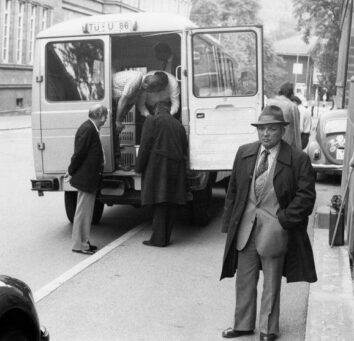
45 Jahre Bürgerrechtsarbeit deutscher Sinti und Roma – Ausstellung in der Universitätsbibliothek Tübingen
17. November 2023, Vortrag von Liliana Ruth Feierstein: „Von Antisemitismus und Antiziganismus“
(Begleitveranstaltung „Der Keller ist besetzt“: Sinti und Roma in Wissenschaft und Widerstand)
Die Ausstellung „45 Jahre Bürgerrechtsarbeit deutscher Sinti und Roma“ wurde durch den Zentralrat Deutscher Sinti und Roma konzipiert und ist von 25. Oktober bis 25. November 2023 in der Wandelhalle der Universitätsbibliothek Tübingen zu sehen. Ausgestellt werden Plakate mit Fotos und Texten, die auf die jahrzehntelange Benachteiligung einer Minderheit aufmerksam machen. Erst 1982 wurden die Verbrechen an den Sinti und Roma in der NS-Zeit durch die Bundesrepublik offiziell als Völkermord anerkannt. Continue reading „45 Jahre Bürgerrechtsarbeit deutscher Sinti und Roma – Ausstellung in der Universitätsbibliothek Tübingen“
Internationaler Workshop: DEUTSCHE EMIGRIERTE RABBINER NACH 1933 UND IHR KULTURELLES ERBE IN GLOBAL-VERGLEICHENDER PERSPEKTIVE
20. – 22. Mai 2024, Abendvortrag von Liliana R. Feierstein: ‚Das Erbe, das wir übernommen haben, weitergeben‘. Deutschsprachige Rabbiner aus Mitteleuropa und Chazzanim im lateinamerikanischen Exil
 Wird geladen …
Wird geladen …
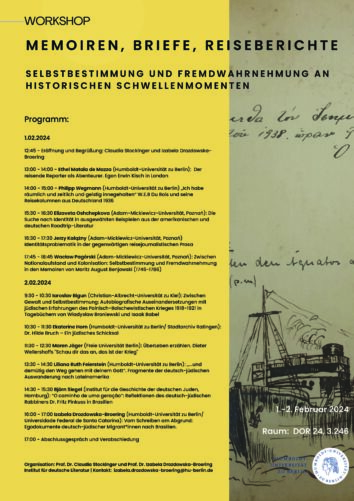
,,…und demütig den Weg gehen mit deinem Gott“. Fragmente der deutsch-jüdischen Auswanderung nach Lateinamerika – Vortrag von Liliana Ruth Feierstein
Berlin 1. und 2. Februar 2024, Workshop: „Memoiren, Briefe, Reiseberichte – Selbstbestimmung und
Fremdwahrnehmung an historischen Schwellenmomenten“
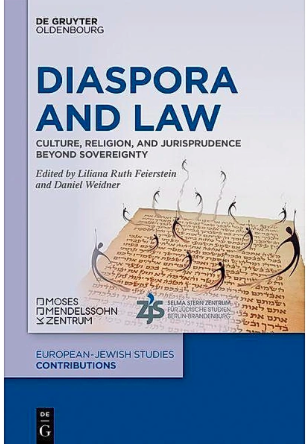
Diaspora and Law Culture, Religion, and Jurisprudence beyond Sovereignty
Veröffentlicht: 18. September 2023. ISBN: 9783111061849
Herausgegeben von: Band 66 der Reihe Europäisch-jüdische Studien – Beiträge
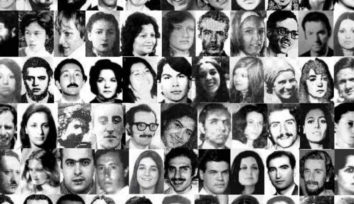
Encuentro: Perspectivas filosóficas sobre la desaparición forzada
El Área de Filosofía del Instituto del Desarrollo Humano de la UNGS organiza el encuentro Perspectivas filosóficas sobre la desaparición forzada: Cuerpo, tiempo y subjetividad. Lunes 8 de mayo de 2023 | Aula 7085 | Campus universitario
Programa de actividades
Apertura 14:00 hs:
- Julia Smola, Decana del IDH; Gisela Suazo, investigadora docente (IDH/UNGS); Susana Lombardi, abogada querellante en causas de DD.HH. (UNM – Área DDHH/UNGS)
Mesa central 15:00 hs.: Tiempos, relatos y des-aparición
- Mariana Tello (IDACOR/CONICET/UNC): (Sin)aparecer: presencias, ausencias y espectros entre los familiares de desaparecidos durante la última dictadura; Liliana Feierstein (Humboldt Universität Berlin): El asesinato en el tiempo Soledad Nivoli (CEPE-UNR): Recolectar sueños, hacer experiencias en tiempos difíciles
17 a 18 hs Pausa – Café
18:00 hs Mesa de cierre: Justicia, testimonio y verdad En el marco del Programa “Filosofías en viaje“ (UNGS – UNC).
- Paula Hunziker (UNC): Justicia y verdad: encuentros y tensiones ante un pasado indominable; Alejandra García (UNGS): Testimonio, tiempo e imprescriptibilidad Gabriela Franco (UNGS-UBA): Lecturas de En orden de aparición.
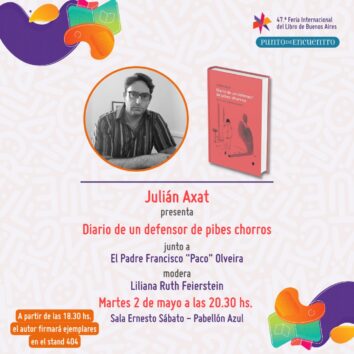
Julián Axat presenta el libro “Diario de un defensor de pibes chorros”, modera Liliana Ruth Feierstein
47° Feria Internacional del Libro de Buenos Aires I 47. Buchmesse in Buenos Aires
Julián Axat presenta el libro “Diario de un defensor de pibes chorros” junto a El Padre Francisco “Paco“ Oliveira, modera Liliana Ruth Feierstein.
Martes 2 de mayo a las 20.30 hs.
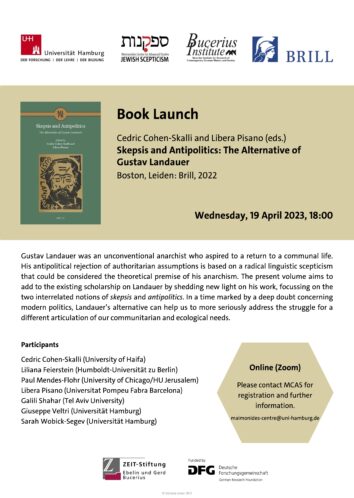
Book Launch: Skepsis and Antipolitics: The Alternative of Gustav Landauer
Cedric Cohen-Skalli and Libera Pisano (eds.) Skepsis and Antipolitics: The Alternative of Gustav Landauer. Boston, Leiden: Brill, 2022
Gustav Landauer was an unconventional anarchist who aspired to a return to a communal life. His antipolitical rejection of authoritarian assumptions is based on a radical linguistic scepticism that could be considered the theoretical premise of his anarchism. The present volume aims to add to the existing scholarship on Landauer by shedding new light on his work, focussing on the two interrelated notions of skepsis and antipolitics. In a time marked by a deep doubt concerning modern politics, Landauer’s alternative can help us to more seriously address the struggle for a different articulation of our communitarian and ecological needs.
Participants
Cedric Cohen-Skalli (University of Haifa)
Liliana Feierstein (Humboldt-Universität zu Berlin)
Paul Mendes-Flohr (University of Chicago/HU Jerusalem) Libera Pisano (Universitat Pompeu Fabra Barcelona) Galili Shahar (Tel Aviv University)
Giuseppe Veltri (Universität Hamburg)
Sarah Wobick-Segev (Universität Hamburg)
Date: Wednesday, 19 April 2023, 18:00 via Zoom (Online). Please contact MCAS for registration and further information. Mail: maimonides-centre@uni-hamburg.de
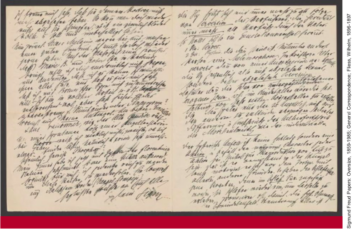
Vortrag von Prof. Dr. Liliana Ruth Feierstein: „RANDBEMERKUNGEN“: DIE KLASSIKER „JÜDISCH“ GELESEN
Die Geschichte der Moderne ist auch eine der Grenzgänge, des Marginalen, der Spuren, der Ausnahmen und Details, der Indizien und Mikrogeschichte(n). Auch des anderen Denkens, der Isolation, der Verbrennung und des Exils, des Zuhörens, des Echos der Vergangenheit sowie des elliptischen Verstehens von etwas, das nicht da, aber trotzdem spürbar ist.
Der Vortrag wird Klassiker der Geistwissenschaften sowohl aus dem deutschsprachigen (u.a. Sigmund Freud, Georg Simmel, Karl Mannheim, Aby Warburg, Walter Benjamin, Vilém Flusser, Hannah Arendt) als auch dem französischsprachigen Raum (Émile Durkheim, Marcel Mauss, Emmanuel Lévinas) in Hinblick auf „ihr“ Judentum, ihre Biographien und ihr Denken deuten, um dadurch einen erinnernden und unerwarteten Blick vorzuschlagen.
Die jüdische Kultur zieht sich wie ein unsichtbarer Faden durch die Geschichte des europäischen Denkens. Die Klassiker „jüdisch“ zu lesen ist auch eine ethische Geste, die eine zum Schweigen gebrachte Geschichte wieder beleuchtet.
Am 09.02.2023 um 18 Uhr via Zoom. Organisiert durch die Eberhard Karls Universität Tübingen am Institut für Erziehungswissenschaft, Allgemeine Pädagogik.
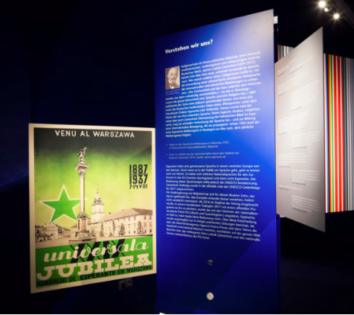
Liliana Feierstein über Esperanto als jüdische, europäische und internationale Sprache
Aktuelle Ausstellung im Jüdischen Museum Hohenems „Die letzten Europäer“
Was war das „Projekt Europa“ und was ist daraus geworden? Und was wird aus ihm werden? Ist die Europäische Gemeinschaft in Zeiten beunruhigender globaler Herausforderungen noch weiter auseinander statt näher zusammengerückt? Werden nationale Interessen immer mehr gegen europäische Lösungen ausgespielt?
Vor dem Hintergrund dieser Fragen blicken wir auf jüdische Individuen, die angesichts der Zerstörungen Europas und der versuchten Vernichtung der europäischen Juden im 20. Jahrhundert nationale und kulturelle Grenzen überschritten, die universelle Geltung von Menschenrechten erneut einforderten und vehement einen europäischen Traum verfolgten. Anhand ihres Engagements für ein geeintes und friedliches Europa erkundet die Ausstellung gleichzeitig dessen neuerliche Bedrohung.
Unter der Überschrift: „Verstehen wir uns?“ ist Ludwik Zamenhof ein Teil der Ausstellung gewidmet. Felicitas Heimann-Jenlinek spricht mit Liliana Feierstein über Zamenhof (1859–1917) und Esperanto als jüdische, europäische und internationale Sprache (Berlin/Wien, 07.01.22). Zum Video.

HÉRITAGES ET RUPTURES DE L’EUROPE DANS LA CONSTRUCTION DE LA JUDÉITÉ LATINO-AMÉRICAINE
ERBSCHAFT UND BRÜCHE EUROPAS IN DER ENTSTEHUNG DES LATEINAMERIKANISCHEN JUDENTUMS
Dieses Projekt befasst sich mit den Ausdrucksformen des lateinamerikanischen Judentums, ausgehend von den historischen und kulturellen Beziehungen zwischen Lateinamerika und Europa seit der zweiten Hälfte des 20. Zwar gibt es bereits zahlreiche Studien über die Erinnerung an jüdische Einwanderer, die von Antisemitismus und Nationalsozialismus heimgesucht wurden, doch die neuen Bedeutungen Europas in der Vorstellungswelt der jüngsten Generationen lateinamerikanischer jüdischer Schriftsteller, Künstler und Intellektueller müssen noch erforscht werden. Frankreich und Deutschland, die Länder im Herzen des europäischen Projekts, sind sowohl kulturelle Referenzen als auch gesellschaftliche Modelle für eine lateinamerikanische jüdische Kulturtradition, die sich zwischen Erbe und Bruch bewegt.
Veranstaltet ua. von Cynthia Gabbay und unter Beteiligung von Liliana Ruth Feierstein.

FILOSOFÍA DE LA TRADUCCIÓN. TRADUCCIÓN DE LA FILOSOFÍA
PHILOSOPHIE DER ÜBERSETZUNG. ÜBERSETZUNG DER PHILOSOPHIE
Am 28.09.22 von 16.30 – 17.15 Uhr spricht Liliana Feierstein über: „La gramática del mesianismo. Zamenhof, el Esperanto y la (des)apropiación de la lengua.“ [online]
Workshops vom 28-29 Septiembre 2022, Universidad Pompeu Fabra, Barcelona.
Organizadora: Dr. Libera Pisano, Marie Sklowodska-Curie Fellow
Anmeldung unter: libera.pisano@upf.edu
Gesamtes Programm und weitere Informationen:
Continue reading „FILOSOFÍA DE LA TRADUCCIÓN. TRADUCCIÓN DE LA FILOSOFÍA“

Liliana Ruth Feierstein über Esperanto – Radiointerview
Die Hoffnung prägte diese Sprache von Anfang an: Als der Warschauer Augenarzt und Philologe Ludwig Leyzer Zamenhof die Grundlagen des „Esperanto“ legte, trug ihn dabei die Idee, dass die Sprache eine zentrale Rolle für die Menschheit und für die Zukunft spielt. Auf der Grundlage eines jüdischen Kosmopolitismus, der die Differenzen nicht nur respektiert, sondern auch zu schützen weiß, schuf Zamenhof eine revolutionäre Übersetzung der jüdischen Sprach- und Sozialideen – und eine bis heute lebendige Plansprache. Liliana Ruth Feierstein, Professorin für transkulturelle Geschichte des Judentums an der Humboldt-Universität Berlin, hat sich eingehend mit der Geschichte des Esperanto beschäftigt und erzählt in hr2-kultur, welche spezifisch jüdische Denktradition mit dieser Sprache verbunden ist.
Hören Sie den Beitrag HIER.

Print Matters: Diaspora and Law. Interview mit den Herausgebern Liliana Ruth Feierstein und Daniel Weidner
8. Januar 2024, RESILIENCE:
„The back cover says: ‚This book discusses pressing questions of how to live together in the new millennium‘, so what came out of this discussion? And how do law and religion interrelate?“
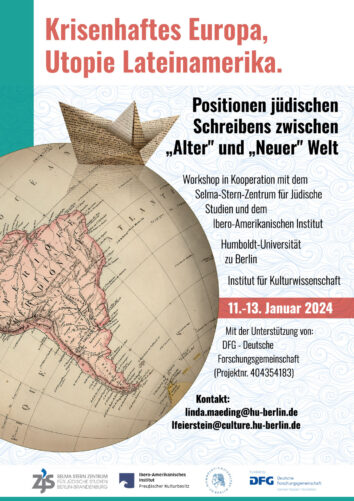
Internationaler Workshop an der Humboldt-Universität zu Berlin
In Kooperation mit dem Selma-Stern-Zentrum für Jüdische Studien und dem Ibero-Amerikanischen Institut (Mecila-Projekt).
Organisation: Prof. Dr. Liliana Ruth Feierstein & Dr. Linda Maeding, Institut für Kulturwissenschaft, HU Berlin, Dr. Andrea Acle-Kreysing, Karlsruher Institut für Technologie/Universität Heidelberg
Der Workshop erforscht das Spannungsfeld utopischer Vorstellungen zwischen den Kontinenten im jüdischen Denken und Schreiben. Im Fokus stehen die Erfahrungen von europäischen Autorinnen und Autoren, die nach Lateinamerika flohen oder emigrierten, sowie von jenen, die Lateinamerika als Utopie in ihren Texten entwarfen.
 Wird geladen …
Wird geladen …

Akademie-Dialog: Gender / Film / Politische Narrative
Akademie-Präsidentin Jeanine Meerapfel sprach mit den Kulturwissenschaftlerinnen Christina von Braun und Liliana Ruth Feierstein darüber, was Gender mit Kunst, Politik und Religion zu tun hat. Anlass war Christina von Brauns kürzlich im Propyläen Verlag erschienenes Buch Geschlecht. Wie beeinflusst die persönliche Herkunft Geschlechterkonstruktionen? Wie wirkt sich Gender auf künstlerische Sprachen, Themen und Haltungen aus?
Sehen Sie den Beitrag HIER.
Lecture Series on Contemporary Religion in Latin America
RINGVORLESUNG__10.11.2023__Prof. Dr.Liliana Ruth Feierstein: „Killing (the) time Catholic and Jewish traces in the mourning work of political violence in Argentina.“
The Center of Religious Studies (CERES) in Bochum will offer a joint seminar and lecture series (Ringvorlesung) on Contemporary Religion in Latin America. This combined course will be offered online and will also be available to students from other universities and departments. This Ringvorlesung will take place during the winter semester of 2023/24.
Das vollständige PROGRAM finden sie hier
Continue reading „Lecture Series on Contemporary Religion in Latin America „

DISKUSSION AM 04.05.22, 19 UHR | LUDWIG ZAMENHOF UND DIE IDEE EINER UNIVERSALEN SPRACHE
Es diskutieren Prof. Dr. Liliana Ruth Feierstein, Professorin für transkulturelle Geschichte des Judentums an der Humboldt-Universität Berlin, Prof. Dr. Sabine Fiedler, Vorsitzende der Gesellschaft für Interlinguistik e. V. und Professorin für anglistische Sprachwissenschaft an der Universität Leipzig und Dr. Anja Christina Stecay, Vorstandsmitglied der Esperanto-Gesellschaft Frankfurt
1887 publizierte der Warschauer Augenarzt und Philologe Ludwig Leyzer Zamenhof (1859-1917) eine Broschüre mit dem Titel „Internationale Sprache“, die zum Gründungsmanifest von Esperanto wurde. Aufgewachsen in Bialystock, träumte er bereits als Jugendlicher von einer „Lingwe Uniwersale“, die die Verständigung in der diversen Stadtbevölkerung stärken und ehemalige Shtetl-Bewohner*innen mit anderen Minderheiten verbinden sollte. Dieser Völkerverständigungsgedanke trägt bis heute die Plansprache Esperanto, die weltweit Anhänger fand und nach wie vor von Millionen Menschen praktiziert wird. Die Gesprächsveranstaltung zum 135-jährigen Jubiläum des Gründungsmanifests wirft einen Blick auf die Geschichte von Ludwig Zamenhof und die Umstände, unter denen sein Werk entstand. Sie geht auf die Idee von Plansprachen im Allgemeinen ein und eröffnet einen besonderen Einblick in die Welt von Esperanto. Im Zentrum des Abends steht die Frage, welche Rolle der Gerechtigkeitsgedanke in dieser weltenumspannenden Plan- und Universalsprache spielt?
Ort: JÜDISCHES MUSEUM. SAAL. BERTHA-PAPPENHEIM-PLATZ 1, 60311 FRANKFURT AM MAIN
Um Anmeldung wird gebeten unter: besuch.JMF-at-stadt-frankfurt.de

6.12.2021 / ab 9:30 Uhr: Diasporic Knowledge
Konferenz (hybrid), Katholische Akademie Berlin (Präsenz)/ Humboldt-Universität zu Berlin (online)
Mit Almút Sh. Bruckstein Çoruh (House of Taswir Berlin), Liliana Feierstein (Humboldt Univ. Berlin), Karma Ben Johanan (Humboldt Univ. Berlin), Wendy M. K. Shaw (Ph.D. Univ. of California, 1999), Sami Khatib (Karlsruhe Univ. of Arts and Design), Salman Sayyid (University of Leeds), Hannah Tzuberi (Free Univ. of Berlin), Elliot Wolfson (Univ. of St. Barbara), Brandon Woolf (New York Univ.), Veronika Zablotsky (Justus-Liebig-Univ. Giessen)
The conference will explore various questions, conceptual challenges and historical examples, concerning diasporic knowledge and epistemologies. We wish to think, for instance, of diaspora and/or exile as existential conditions of critical thought, which takes a distance from its own – social, cultural, political – location, in order to question it. Beyond individual parameters, what kind of collective features enable diasporization or de-territorialization of knowledge and thought? What kinds of space, of territory, allow and support the existence of diasporic cultures, what kind of language, of collective performances, of narratives, of laws? What is the relation between diaspora, exile and cosmopolitism? What configurations of universality and particularity they produce or render possible? How were and are these questions negotiated in historical and contemporary cultures of the diasporic knowledge, for instance rabbinic ones?
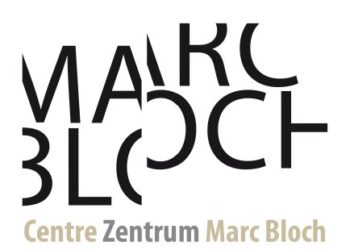
7.12.2021 / 17 Uhr: Toleranz, Religion und Aufklärung. Zur Aktualität des 18. Jahrhunderts
Podiumsdiskussion, Centre Marc Bloch, Tillion–Saal (Anmeldung erbeten!)
Mit einer Einführung von Avi Lifschitz (Magdalen College Oxford) und Kurzbeiträgen von Mattias Asche (Univ. Portsdam), Iwan D’Aprile (Univ. Potsdam), Liliana Feierstein (HU Berlin) und Maiwenn Roudaut (CMB)
Anlässlich der Wiedereröffnung des Hugenottenmuseums Berlin und in Zusammenarbeit mit der französischen Botschaft in Berlin/Institut français d‘Allemagne lädt das Centre Marc Bloch ein zu einer wissenschaftlichen Diskussion…
Der Säkularisierungsprozess, der die Entwicklung der europäischen Moderne begleitet hat, wird in der Forschung oft als Antwort auf die Herausforderung der Aufklärung interpretiert. Die Ereignisse in den letzten Jahrzehnten zeigen jedoch, dass die Frage des friedlichen Zusammenlebens zwischen gläubigen und nicht-gläubigern Bürgern in den öffentlichen Debatten Europas nicht verschwunden ist. Vielmehr sind sie in den Mittelpunkt der Diskussion unserer Zeit gerückt. Mit besonderer Schärfe stellt sich also die Frage der Aktualität der Aufklärung zum Thema Religion und Toleranz in unserer heutigen demokratischen Gesellschaft. Mit unserer Veranstaltung möchten wir im Centre Marc Bloch der Diskussion eine weitere Facette hinzufügen: Wie steht es um die Werte der Aufklärung angesichts der historischen Erfahrungen der letzten Jahrhunderte?
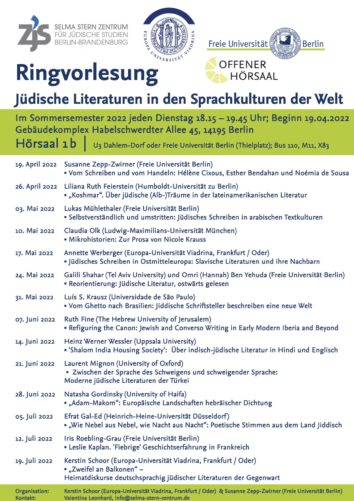
VORTRAG AM 26.04.22, 18:15-19:45 UHR | „KOSHMAR“. ÜBER JÜDISCHE (ALB-)TRÄUME IN DER LATEINAMERIKANISCHEN LITERATUR
Im Rahmen der Ringvorlesung „Jüdische Literaturen in den Sprachkulturen der Welt“
Vortrag von Prof. Dr. Liliana Ruth Feierstein, Kultur-, Sozial- und Bildungswissenschaftliche Fakultät, Institut für Kulturwissenschaft, Humboldt-Universität zu Berlin. Link zum Mitschnitt.
Die Plätze im Hörsaal können ggfs. wegen der aktuellen Corona-Bestimmungen begrenzt sein. Diejenigen, die die Vorlesung als Präsenzveranstal-tung besuchen möchten, werden um einmalige Anmeldung gebeten unter: info@selma-stern-zentrum.de
Hörsaal 1b, Gebäudekomplex Habelschwerdter Allee 45, 14195 Berlin
Livestream: www.fu-berlin.de/offenerhoersaal
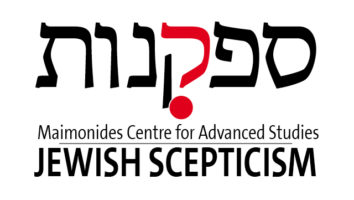
Hope as the Flipside of Scepticism: The History of Esperanto as Jewish Linguistic Utopia
Research Project, Maimonides Centre for Advanced Studies, Universität Hamburg
Liliana Ruth Feierstein, Senior Fellow von Oktober 2021 bis Februar 2022
What is the flipside of scepticism? Is it hope? And what is the Jewish name for this hope? Hatikva? Or perhaps Esperanto? Can mistrust among human beings be eradicated by a linguistic utopia? Can language become a faith? In the matter of scepticism and violence, can the former be neutralised by trust in (a new) language? Is it possible that conflict among humans might not be caused by language itself, but by incomprehension among speakers? Is language a begetter of violence? Could a neutral tongue, without a sole owner, become a weapon for humankind?
This contra-project proposes to consider these divergent viewpoints within the Jewish tradition in which language (and silence) play an immense role, whether from the perspective of utopian hope or linguistic scepticism: language and writing are at the core of tradition, of revelation, and of the diasporic situation: a portatives Vaterland (Heine, “portable homeland”). It will analyse Zamenhof’s texts and the history of Esperanto in dialogue with the Jewish philosophy of language (Baruch Spinoza, Moses Mendelssohn, Walter Benjamin, etc.), but also with the creators of another new Jewish language: Modern Hebrew (Ben Yehuda and Ahad Ha’am). The problem of sources and translations is also of vital concern given their role in the construction of the humanity and sacrality of language.
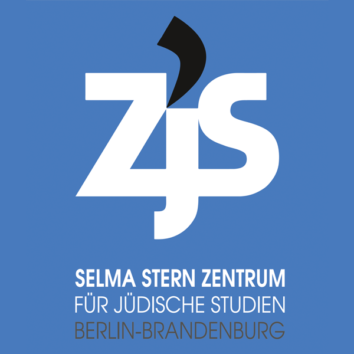
Selma Stern Zentrum für Jüdische Studien Berlin-Brandenburg nachhaltig gesichert!
Am Montag, dem 1. November, wurde eine Kooperationsvereinbarung unterzeichnet, dank der das Fortbestehen des wissenschaftlichen Verbundprojektes der Region für die kommenden zehn Jahre institutionell gewährleistet wird.
Getragen wird der 2012 gegründete überregionale Verbund von acht maßgeblichen Akteuren, die sich der wissenschaftlichen Erforschung der Geschichte und Kultur des Judentums in seinen religiösen und kulturellen Ausprägungen widmen: der Freien Universität Berlin, der Humboldt-Universität zu Berlin, der Technischen Universität Berlin, der Europa-Universität Viadrina Frankfurt (Oder), der Universität Potsdam, dem Abraham Geiger Kolleg, dem Moses Mendelssohn Zentrum für europäisch-jüdische Studien und der Thüringer Hochschule für Musik Franz LisztWeimar. Der Sitz des Zentrums wechselt im Rahmen der neuen Kooperationsvereinbarung von der Humboldt-Universität zu Berlin an die Freie Universität Berlin.
Link zur vollständigen Pressemeldung der Trägerinstitutionen
Répercussions — Influences littéraires et philosophiques françaises et allemandes dans la construction d’une judéité latino-américaine: modèles et contre-modèles
Internationaler Workshop in Gießen
28. und 29. Oktober 2021
 Wird geladen …
Wird geladen …

OTROS INFIERNOS. LA TESTIMONIANZA DI PRIMO LEVI COME SUPPORTO ALLA RIELABORAZIONE DELLA DITTATURA ARGENTINA DA PARTE DEI SOPRAVVISSUTI
Gariwo – la foresta dei Guili,
14.4.2021 (Editorial)
Von Liliana Ruth Feierstein. (Übersetzung ins Italienische: Dorle W. Bascone und Giovanna G. Kuck.)
Le mezuzot, piccoli contenitori che si pongono sugli stipiti delle porte delle case e dei luoghi ebraici, li segnano ricordando che lì si rispetta la legge ebraica. Dentro la capsula è contenuto un passo della Torà (Deuteronomio 6,4-9 e 11,13-21) che include lo Shemà Israel; la preghiera dell’ascolto e del comandamento del ricordo (Zachor).
L’importanza delle testimonianze di Levi è inestimabile non solo per la sua ricchezza, per poter comprendere la Shoah, ma anche come fonte per riflettere e rielaborare altre esperienze traumatiche di estrema violenza. In questa relazione intendo dimostrare (molto brevemente) alcuni esempi di intertestualità e il ruolo della scrittura di Levi nelle testimonianze relative ai centros de detención y tortura dell’ultima dittatura in Argentina (1976-1983).
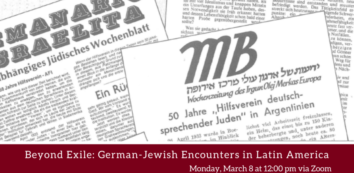
Beyond Exile: German-Jewish Encounters in Latin America
„WEBINAR“ via ZOOM,
University of Minnesota,
8. März 2021, 12 Uhr
u.a. Liliana Ruth Feierstein: „The Heritage of Breslau, or: Some Stories that Had Not (yet) Been Told about (German-) Jewish History in Latin America“
Approximately 100,000 Jewish refugees arrived in Latin America between 1933-1945, as they fled Nazi persecution in Central Europe. In different countries in the region, these refugees found more than a safe haven. The three presentations in this panel explore various facets in the lives of displaced Central-European Jews in Latin America, highlighting interactions with their new surroundings, cultural transfers and everyday experiences.
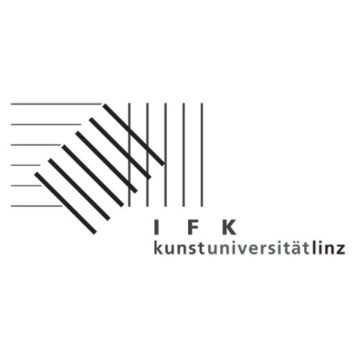
Ludwik Lejzer Zamenhof: Eine jüdische Sprachutopie für eine Welt ohne Gewalt (Liliana Ruth Feierstein)
Universalsprachen, Kunstsprachen, Plansprachen: Träume und Utopien von einer Welt ohne Übersetzung
Spätestens seit Leibniz und seiner characteristica universalis wurden immer wieder Konzepte für die Entwicklung einer Universal- oder Einheitssprache vorgeschlagen und umgesetzt. Nicht selten scheiterten diese Konzepte jedoch an ihren Ansprüchen.
So sprechen beispielsweise heute – mehr als hundert Jahre nach der Drucklegung von Ludwik Lejzer Zamenhofs Unua Libro (1887) – lediglich etwa tausend Menschen weltweit Esperanto als Muttersprache; die geschätzte Zahl aktiver SprecherInnen variiert zwischen 100.000 und zehn Millionen, je nach vorausgesetztem Niveau der Sprachbeherrschung. Auch die International Semantography (1949) von Charles K. Bliss, ein Symbolsystem, das readable in all languages sein sollte, enttäuschte die Erwartungen des Autors. Auf der anderen Seite haben sich Programmiersprachen, Verkehrszeichen oder piktografische Leitsysteme in der Tradition von Otto Neuraths Isotype, dem International System of Typographic Picture Education, nahezu weltweit verbreitet und durchgesetzt. Continue reading „Ludwik Lejzer Zamenhof: Eine jüdische Sprachutopie für eine Welt ohne Gewalt (Liliana Ruth Feierstein)“
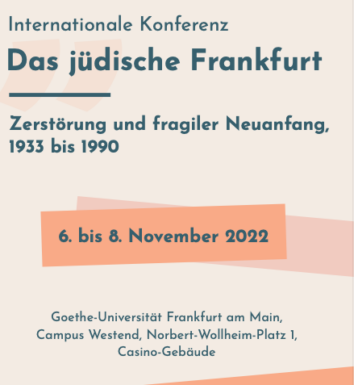
Das jüdische Frankfurt / Zerstörung und fragiler Neuanfang 1933 bis 1990
Frankfurt am Main war bis 1933 eines der wichtigsten Zentren jüdischen Lebens und jüdischer Kultur in Europa. Während der nationalsozialistischen Herrschaft wurden auch die Frankfurter Jüdinnen und Juden systematisch entrechtet, verfolgt und ermordet, die jüdischen Gemein- den aufgelöst. Die Konferenz widmet sich der Geschichte des jüdischen Frankfurt im NS-Staat und zeichnet dessen Bedrohung und Zerstörung nach. Unter dem Schutz der US-amerikanischen Militärverwaltung gründete sich in der Nachkriegszeit eine neue jüdische Gemeinde, mehrere jüdische Organisationen siedelten sich in der Stadt an, und es entwickelte sich neues jüdisches Leben. Die Kon- ferenz behandelt auch diese Geschichte bis in die 1980er Jahre, als gerade von Frankfurt Impulse für eine neue Sichtbarkeit der jüdischen Gemeinschaft in der Bundes- republik ausgingen. Sie findet im Rahmen des Projekts „Synagogen-Gedenkbuch Hessen“ statt, das die Geschichte der hessischen jüdischen Gemeinden und ihrer Synagogen erforscht und dokumentiert.
Am 07.11.22 spricht Liliana Ruth Feierstein im Panel Frankfurter Jüdinnen und Juden im Exil über: „O drama judaico. Heinrich Lemle zwischen den Welten“.
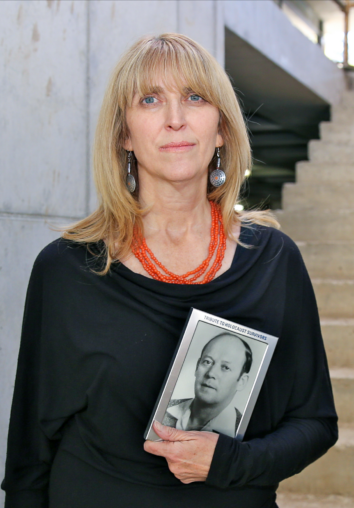
SELMA STERN LECTURE I 16. JUNI 2022 I TALI NATES (JOHANNESBURG)
„REMEMBERING THE HOLOCAUST AND GENOCIDE IN AFRICA: THE CASE STUDY OF THE JOHANNESBURG HOLOCAUST & GENOCIDE CENTRE“
Zu Ehren seiner Namensgeberin hat das Selma Stern Zentrum für Jüdische Studien Berlin-Brandenburg mit der Selma Stern Lecture 2019 eine Vorlesungsreihe ins Leben gerufen, die sich insbesondere Themen der Entwicklung und Fortentwicklung der Wissenschaft des Judentums – ausgehend von der Haskala bis zu den Jüdischen Studien der Gegenwart – widmet.
Datum: 16. Juni 2022 I Zeit: 19:00 Uhr I Ort: Mendelssohn-Remise, Jägerstr. 51, 10117 Berlin

NS-Raubkunst: Neue interdisziplinäre Perspektiven in der Provenienzforschung und der Restitutionspraxis im deutsch-französischen Kontext
WORKSHOP TEIL II | DIENSTAG, 10. MÄRZ 2020 | AB 13 UHR | KONFERENZRAUM ADENAUERALLEE 35 53113 BONN
Aufbauend auf dem Treffen von Februar 2019 laden das Büro für Hochschulkooperation der französischen Botschaft in Bonn, die Commission pour l’indemnisation des victimes de spoliations (CIVS), das Deutsche Zentrum Kulturgutverluste und die Mission de recherche et de restitution des biens culturels spoliés de 1933 à 1945 (französisches Kulturministerium) zum Workshop „NS-Raubkunst : Neue interdisziplinäre Perspektiven in der Provenienzforschung und der Restitutionspraxis im deutsch-französischen Kontext“ ein. Kunsthistoriker*innen, Rechts- und Wirtschaftswissenschaftler*innen sowie Soziolog*innen diskutieren u.a. über die heutige Rolle der Provenienzforschung und der Restitutionspraxis und gehen Fragen der Quellenerschließung und des Handels mit NS-Raubkunst nach.
Abgerundet wird der Workshop mit einem Festvortrag von Beate Klarsfeld, in Anwesenheit der französischen Botschafterin, I.E. Anne-Marie Descôtes.
Der Workshop wird auf Deutsch und Französisch abgehalten (Simultanübersetzung durch einen Dolmetscherservice).
Anmeldung erforderlich bis zum 3. März 2020: kulturassistent@uni-bonn.de

Am 05.02.2020 im Kino arsenal Berlin
Im Rahmen des Projekt-Seminars „Remontagen in der deutschen Nachkriegszeit“ am Institut für Kulturwissenschaft wird der Film THERESIENSTADT. EIN DOKUMENTARFILM AUS DEM JÜDISCHEN SIEDLUNGSGEBIET und THERESIENSTADT SIEHT AUS WIE EIN CURORT (Nadja Seelich und Bernd Neuburger, 1997) sowie Harun Farockis AUFSCHUB (2007) gezeigt.
Zu Gast: Veronika Zangl, Theater- und Literaturwissenschaftlerin (u.a. Poetik nach dem Holocaust. Erinnerungen – Tatsachen – Geschichten, 2009).
Der von der SS konzipierte und produzierte Propagandafilm THERESIENSTADT. EIN DOKUMENTARFILM AUS DEM JÜDISCHEN SIEDLUNGSGEBIET wurde 1944 realisiert. Kurt Gerron, der als prägnante Erscheinung im Film und auf Berliner Bühnen der 20er Jahre bekannt war, wurde gezwungen, die Regie zu übernehmen, an dem darüber hinaus zahlreiche Häftlinge mitwirken mussten. In krassem Gegensatz zur offiziellen antisemitischen Propaganda war der Zweck dieses nur in Fragmenten erhaltenen Films, die NS-Vernichtungs-, Ghetto- und Konzentrationspolitik für ein internationales Publikum sowie für das Rote Kreuz zu verharmlosen.
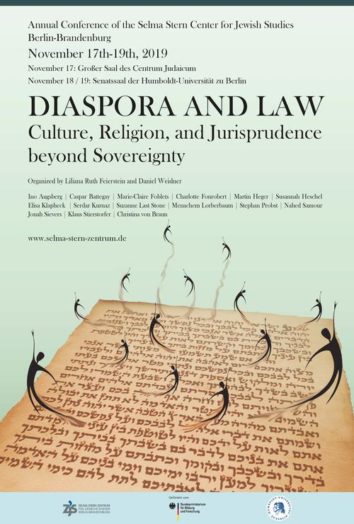
Diaspora and Law: Culture, Religion, and Jurisprudence beyond Sovereignty
Annual Conference of the Selma Stern Center for Jewish Studies Berlin-Brandenburg.
Programm from 17.11.2019 – 19.11.2019
Today, law is no longer homogenous or unquestioned. Different overlapping legal systems constantly interfere with one another, both on an international level, in complex transnational contexts such as the European Union or human rights law, but also in the context of cultural diversity or conflicts between religious norms and civil institutions. On the other hand, the neutrality of law is also under growing pressure, be it from different global transnational players, or from within nation states where calls are made to adapt law to the will of “the people.” The heated European debate on the “refugee crisis” has made it manifest that law is more necessary than ever and yet fundamentally contested, perhaps even caught in contradictions and self-limitations. At the same time, the current perspective on legal problems allows us to address issues of diversity and the role of Europe in the globalized world more clearly. The Selma-Stern Center for Jewish Studies in Berlin-Brandenburg takes these recent developments and debates as a starting point to discuss the pressing question of how to live together in the new millennium and how to figure the long history of law before, besides, and after the dominant paradigm of state law. Continue reading „Diaspora and Law: Culture, Religion, and Jurisprudence beyond Sovereignty“
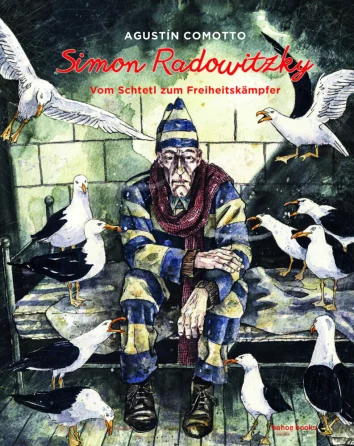
Neuerscheinung: Comic-Biographie von Agustín Comotto
Erschienen bei bahoe books
Mit einem Vorwort von Liliana Ruth Feierstein. Aus dem argentinischen Spanisch von Lea Hübner.
Eine wunderschön in Schwarz und Rot illustrierte Comic-Biographie, welche die Geschichte von Simón Radowitzky (1891–1956) erzählt, einer sanften Seele, die in einer grausamen Welt gefangen ist.
Sein turbulentes Leben beginnt in einem russischen Schtetl, wo ihn die Kinderarbeit und die antisemitischen Pogrome durch Kosaken radikalisieren. Nach der gescheiterten Revolution 1905 flüchtet er nach Argentinien und findet bald Anschluss an die starke anarchistische Bewegung dort. Bei einer Demonstration am 1. Mai 1909 wurden 100 Arbeiter erschossen und Simon Radowitzky beschließt, sich mit einer Bombe am Einsatzleiter Oberst Falcon zu rächen. Es folgen turbulente Zeiten, mit einem langen Aufenthalt als Gefangener in Ushuaia (Patagonien), der Teilnahme an der Spanischen Revolution ab 1936 und der erneuten Flucht nach Mexiko, wo er 1956 stirbt. Comotto recherchierte und zeichnete sechs Jahre an diesem Meisterwerk. Im Anhang finden sich alle verwendeten Quellen und kurze Biographien der historischen Persönlichkeiten.

Preis zur Förderung herausragender geistes- und sozial- wissenschaftlicher Publikationen
Dr. Lutz Fiedler erhielt für die Übersetzung von „Matzpen, Eine andere israelische Geschichte“ , Vandenhoeck & Ruprecht, Göttingen 2017“ den im Herbst 2018 verliehenen, Preis zur Förderung herausragender geistes- und sozialwissenschaftlicher Publikationen vom Börsenverein des Deutschen Buchhandels, der Fritz Thyssen Stiftung, dem Wissenschaftsfonds der VG WORT und des Auswärtigen Amts.